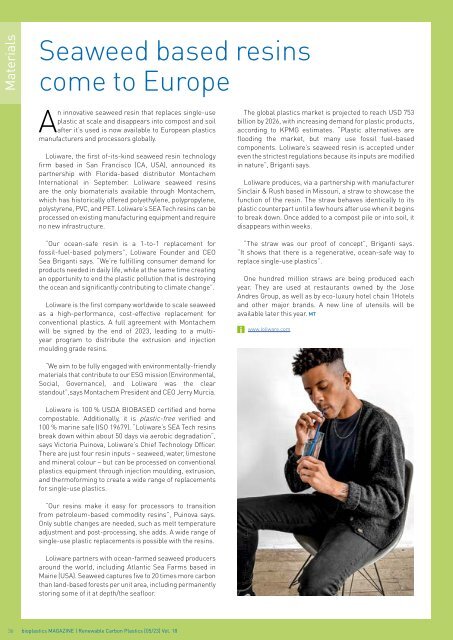Issue 05/2023
Highlights Fibres / Textiles Polyurethane / Elastomers
Highlights
Fibres / Textiles
Polyurethane / Elastomers
You also want an ePaper? Increase the reach of your titles
YUMPU automatically turns print PDFs into web optimized ePapers that Google loves.
Materials<br />
Seaweed based resins<br />
come to Europe<br />
An innovative seaweed resin that replaces single-use<br />
plastic at scale and disappears into compost and soil<br />
after it’s used is now available to European plastics<br />
manufacturers and processors globally.<br />
Loliware, the first of-its-kind seaweed resin technology<br />
firm based in San Francisco (CA, USA), announced its<br />
partnership with Florida-based distributor Montachem<br />
International in September. Loliware seaweed resins<br />
are the only biomaterials available through Montachem,<br />
which has historically offered polyethylene, polypropylene,<br />
polystyrene, PVC, and PET. Loliware’s SEA Tech resins can be<br />
processed on existing manufacturing equipment and require<br />
no new infrastructure.<br />
“Our ocean-safe resin is a 1-to-1 replacement for<br />
fossil-fuel-based polymers”, Loliware Founder and CEO<br />
Sea Briganti says. “We’re fulfilling consumer demand for<br />
products needed in daily life, while at the same time creating<br />
an opportunity to end the plastic pollution that is destroying<br />
the ocean and significantly contributing to climate change”.<br />
Loliware is the first company worldwide to scale seaweed<br />
as a high-performance, cost-effective replacement for<br />
conventional plastics. A full agreement with Montachem<br />
will be signed by the end of <strong>2023</strong>, leading to a multiyear<br />
program to distribute the extrusion and injection<br />
moulding grade resins.<br />
The global plastics market is projected to reach USD 753<br />
billion by 2026, with increasing demand for plastic products,<br />
according to KPMG estimates. “Plastic alternatives are<br />
flooding the market, but many use fossil fuel-based<br />
components. Loliware’s seaweed resin is accepted under<br />
even the strictest regulations because its inputs are modified<br />
in nature”, Briganti says.<br />
Loliware produces, via a partnership with manufacturer<br />
Sinclair & Rush based in Missouri, a straw to showcase the<br />
function of the resin. The straw behaves identically to its<br />
plastic counterpart until a few hours after use when it begins<br />
to break down. Once added to a compost pile or into soil, it<br />
disappears within weeks.<br />
“The straw was our proof of concept”, Briganti says.<br />
“It shows that there is a regenerative, ocean-safe way to<br />
replace single-use plastics”.<br />
One hundred million straws are being produced each<br />
year. They are used at restaurants owned by the Jose<br />
Andres Group, as well as by eco-luxury hotel chain 1Hotels<br />
and other major brands. A new line of utensils will be<br />
available later this year. MT<br />
www.loliware.com<br />
“We aim to be fully engaged with environmentally-friendly<br />
materials that contribute to our ESG mission (Environmental,<br />
Social, Governance), and Loliware was the clear<br />
standout”,says Montachem President and CEO Jerry Murcia.<br />
Loliware is 100 % USDA BIOBASED certified and home<br />
compostable. Additionally, it is plastic-free verified and<br />
100 % marine safe (ISO 19679). “Loliware’s SEA Tech resins<br />
break down within about 50 days via aerobic degradation”,<br />
says Victoria Puinova, Loliware’s Chief Technology Officer.<br />
There are just four resin inputs – seaweed, water, limestone<br />
and mineral colour – but can be processed on conventional<br />
plastics equipment through injection moulding, extrusion,<br />
and thermoforming to create a wide range of replacements<br />
for single-use plastics.<br />
“Our resins make it easy for processors to transition<br />
from petroleum-based commodity resins”, Puinova says.<br />
Only subtle changes are needed, such as melt temperature<br />
adjustment and post-processing, she adds. A wide range of<br />
single-use plastic replacements is possible with the resins.<br />
Loliware partners with ocean-farmed seaweed producers<br />
around the world, including Atlantic Sea Farms based in<br />
Maine (USA). Seaweed captures five to 20 times more carbon<br />
than land-based forests per unit area, including permanently<br />
storing some of it at depth/the seafloor.<br />
36 bioplastics MAGAZINE | Renewable Carbon Plastics [<strong>05</strong>/23] Vol. 18

















